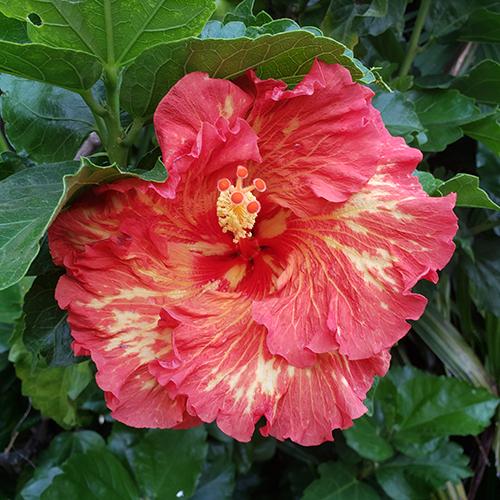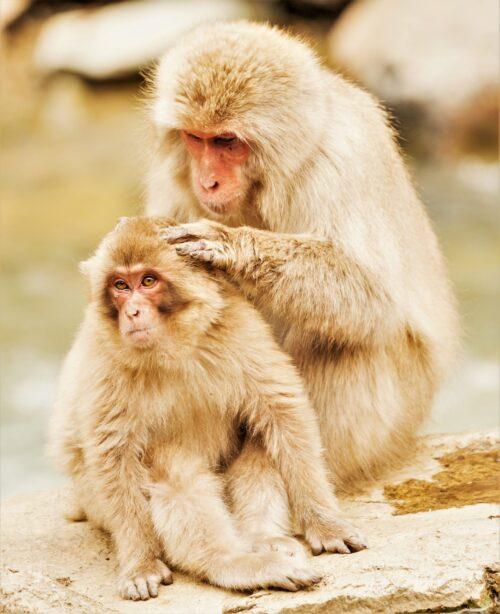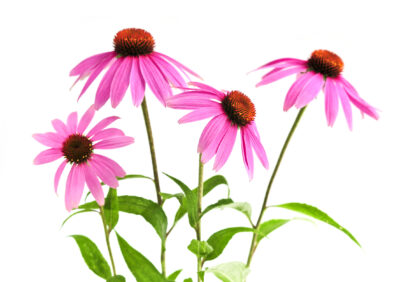
Benefits of Hibiscus
Hibiscus helped save our puppy We found a pedigree Golden retriever for sale for $50 in the local paper. At the time, they were selling

While attending San Diego State College in the early seventies, my work-study job was in the vivarium, a room for keeping and raising animals for observation and research. We called it the animal room. I fed them and cleaned their enclosures daily, getting to know some of them intimately.
One behavior I learned from the primates was grooming, a behavior characterized by one individual manually or orally manipulating the hair or skin of another individual. While this behavior did serve a hygienic function, grooming is also well-known to facilitate and reflect social bonding between individuals.
After observing them groom each other, I began to engage in the practice with them, allowing them to groom me. It involved picking at scabs and flaky places on the skin and eating them. Years later, after one of my primate “friends” was transferred to the zoo, she would recognize and greet me.
And while we’ve been told not to pick our scabs, after injury to the skin it is instinctive for animals and man to lick the wound, promoting healing and reducing bacterial contamination. There have been reports that Fijian fishermen deliberately allow dogs to lick their wounds to promote rapid healing.
When Ann Wigmore, the founder of wheat grass therapy, had both of her ankles shattered in a horse and wagon accident as a child, her father gave his consent to have her feet amputated just above the ankles. Fortunately, she had just turned 18, and could reverse his decision.
Sunshine, eating grasses and the instinct of a little dog who licked her wounds, as well as her own determination to heal, eventually restored her feet to health and strength.
Saliva contains antimicrobial substances including thiocyanate which promotes bacteriostatic processes and lysozymes, spherical vesicles that contain around 50 enzymes that can digest many types of biomolecules, including proteins, DNA, RNA, polysaccharides, and lipids. Lysosomes are acidic and have a pH that’s optimal for the enzymes’ activity, similar to the stomach.
Furthermore, salivary glands concentrate nitrate which is rapidly converted to nitrite by facultative anaerobes on the tongue surface. When acidified, nitrite is converted to nitric oxide, a powerful antimicrobial substance manufactured by mammalian cells from L-arginine in response to invading microbial pathogens.
Since the surface of skin is acidic, it is postulated that salivary nitrite may, on contact with the skin, produce nitric oxide. To test this hypothesis testers measured nitric-oxide synthesis from the skin of 14 healthy volunteers’ hands after asking them to lick them all over and compared this with the effect of 0·9% saline solution.
The finding suggests that nitric oxide derived from salivary nitrite applied to the skin contributes to the antimicrobial effects of wound licking.
Teaching comprehensive holistic education since 1985.
We are currently offering interactive hybrid courses including Herbal Fundamentals, Energy Healing, Aromatherapy and Clinical Herbology
Hybrid means you may choose to participate in each individual class in the hybrid course online or in person.
All of our products are made with love from organic, all-natural and ethically sourced ingredients.
We began making and perfecting our own herbal remedies more than thirty years ago and offer our favorite products for purchase.

Hibiscus helped save our puppy We found a pedigree Golden retriever for sale for $50 in the local paper. At the time, they were selling
Hawthorn Berry Hawthorn is known as the heart herb for its many benefits as a heart tonic. The berry has been a key part of

Can you take herbal supplements to arm your immune system? You probably know that zinc, vitamin D and vitamin C are gotta-have-its. How about herbal

While attending San Diego State College in the early seventies, my work-study job was in the vivarium, a room for keeping and raising animals for